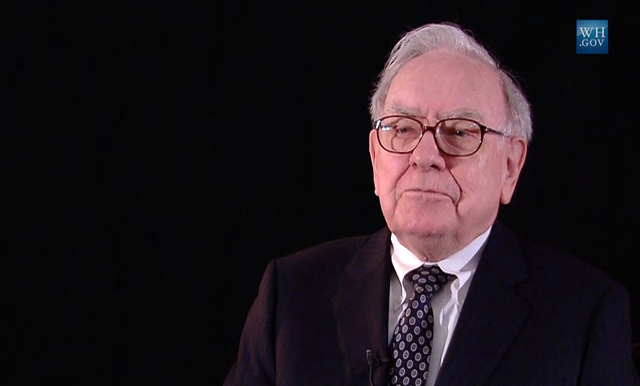Warren Buffett Drops Bombshell: Higher Taxes Likely as US Debt Soars to $34 Trillion
Warren Buffett, the "Oracle of Omaha," has issued a stark warning that no American taxpayer wants to hear: the US government is likely to increase taxes rather than reduce spending in response to the nation's soaring debt crisis. At his annual Berkshire Hathaway shareholder meeting, the billionaire investor predicted a future of higher tax rates as the US grapples with its ballooning fiscal deficits and a national debt that recently topped a staggering $34 trillion.
This alarming forecast comes at a time when the US economy is showing mixed signals. While Buffett's conglomerate, Berkshire Hathaway, reported a robust 39% increase in operating earnings to $11.2 billion, the legendary investor painted a grim picture of the nation's long-term fiscal health. Buffett's concern is that with the national debt now nearly equal to the entire US economy, Washington has little choice but to impose tax hikes to cover the deficit.
The US Debt Crisis: A $34 Trillion Nightmare
Buffett’s warning is rooted in reality: according to the Congressional Budget Office, the federal deficit is expected to surge to 8.5% of GDP by fiscal 2054, up from the current 5.5%. With the government unable to control spending, Buffett suggests that increasing taxes on individuals and businesses is likely the only path forward. "They may not want to decrease spending," Buffett stated. "So they may decide they'll take a larger percentage of what we own, and we'll pay it."
As the national debt continues to climb, concerns about its long-term sustainability are mounting. The latest data shows that the US debt has now surpassed $34 trillion, a level so high that it almost matches the entire US economy's output. The Biden administration, which has faced bipartisan criticism over government spending, finds itself in a precarious position as it attempts to balance rising fiscal deficits with the demands of its various programs. The situation is exacerbated by inflation and the costs associated with an aging population and rising healthcare expenses.
While Buffett acknowledges that the debt’s size may not pose an immediate risk to the economy—since the US dollar remains the world’s reserve currency—he cautions that the government's ability to manage its debt is becoming increasingly strained. "My best speculation is that US debt will be acceptable for a very long time because there's not much alternative," Buffett remarked. However, even with the US dollar’s global dominance, Buffett warns that the increasing fiscal deficit is unsustainable and will likely require a course correction in the form of tax hikes.
Tax Hikes and the Future of the Economy
The potential tax hikes come as the US faces a confluence of economic challenges. The nation’s budget deficit is expected to deepen if tax cuts introduced in 2017 are renewed. While inflation remains stubbornly high, these tax cuts, which were designed to stimulate economic growth, may only add to the fiscal woes if extended. Buffett’s comments suggest that tax hikes are the most viable solution for controlling the deficit, but they will likely be deeply unpopular with taxpayers.
Buffett has long been a proponent of fair taxation, and he pointed out that fiscal policies will eventually need to reflect the reality of an aging population and rising national obligations. As the government looks to tackle this issue, taxes on corporations and high earners are expected to rise, placing an increased burden on taxpayers across the board.
Buffett also warned that the growing fiscal deficit is becoming an increasingly urgent issue. The deficit, which continues to expand despite efforts to address it, has now become larger than the US Treasury market itself—a financial milestone that signals just how deeply entrenched the problem has become. With the US Treasury market totaling nearly $27 trillion, Buffett’s comparison highlights the enormity of the challenge ahead.
The issue isn’t just about managing the national debt—Buffett highlighted that the US is currently dealing with "fiscal policies" that extend far beyond just interest rate decisions made by the Federal Reserve. The government’s ongoing fiscal decisions, including its handling of spending, tax policies, and entitlement programs, will have a more profound impact on the US economy than short-term interest rate adjustments made by the central bank.
Berkshire Hathaway's Shifting Strategy Amid Economic Uncertainty
While Buffett is focused on the nation’s fiscal woes, his company has also been making some significant moves. Berkshire Hathaway reduced its stake in Apple by more than $40 billion, trimming its holding to $135.4 billion by the end of Q1 2024. Despite this massive sale, Buffett reassured shareholders that Apple remains one of Berkshire’s most valuable investments, describing the tech giant as “an even better stock” than American Express or Coca-Cola—two other flagship companies in his portfolio.
Buffett’s decision to trim Apple was likely influenced by the changing economic landscape, with tax considerations playing a role in the sale. "The iPhone was one of the greatest products of all time," Buffett stated. But despite his admiration for Apple, he acknowledged that the tax implications surrounding capital gains may have influenced the move. Additionally, he discussed how Berkshire Hathaway’s overall portfolio is adjusting to the shifting economic realities, with a focus on ensuring long-term growth and profitability despite the broader economic uncertainty.
The move raised eyebrows, but Buffett reassured investors that his company’s strategy remains sound. Berkshire Hathaway has continued to deliver impressive results, with the conglomerate reporting a 39% year-over-year increase in operating earnings, totaling $11.2 billion. This performance came despite global uncertainties, including inflationary pressures and rising interest rates, signaling that Buffett's investment strategies are designed to weather economic storms.
Warren Buffett's Calm Amidst Chaos: A Vision for the Future
Despite these turbulent times, Buffett remained upbeat about the future of Berkshire Hathaway. He assured shareholders that the company’s future is secure, with Greg Abel, the appointed successor to Buffett, ready to step in when necessary. "When you've got somebody like Greg and Ajit, why settle for me?" Buffett quipped, referring to his two trusted lieutenants who have helped steer the company to new heights.
Related: Trump’s Ultimate Tax Cut Proposal: Is Replacing Income Taxes with Tariffs Feasible?
Buffett also pointed to the successful transition at Apple when Tim Cook took over from Steve Jobs, emphasizing that a well-structured company is more important than any single individual. As the 93-year-old investor prepares for eventual retirement, his confidence in the leadership of his chosen successors gives hope to shareholders that Berkshire Hathaway’s long-term strategy will remain intact.
Buffett’s calm demeanor and focus on long-term growth serve as a stark contrast to the broader uncertainty facing the US economy. While the US government struggles with its mounting fiscal deficit, Buffett continues to offer insights that are rooted in a deep understanding of economics and finance. His advice to taxpayers: brace for higher taxes, as the government looks to balance its books amid a growing national debt that shows no signs of slowing down.
As the US faces a difficult road ahead with rising debt and the specter of higher taxes, Buffett’s words offer a sobering glimpse into the future of both the nation’s economy and the financial landscape at large. Will taxes increase, and if so, by how much? The answer will have significant implications for every American taxpayer.
Warren Buffett’s forecast about the inevitability of higher taxes serves as a wake-up call for both investors and taxpayers. As the national debt continues to grow unchecked, tax hikes seem increasingly likely, particularly as government spending remains difficult to control. While Buffett's predictions are rooted in economic realities, his cautionary stance is a reminder that fiscal prudence is critical for long-term stability. The US government will need to act decisively to address its debt, and while higher taxes may be unpopular, they may prove to be the only viable option to balance the nation’s finances in the coming years.














